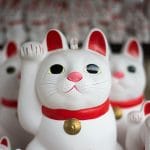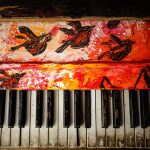Our garden shed doors coughed out cobwebs.
It was early spring, but all I felt was late. I needed to till the garden bed, get the kale seeds in the ground, and give the compost pile a turn.
I always have to give the compost pile a turn.
Pulling on my gloves, I scooped up my tools, checking to make sure I didn’t bring any spiders with me and shaking off the lethargy of winter. It had been a long one, and my bones felt it. I needed spring: green, new life, hopeful. I smacked the hoe hard into the ground. How sentimental I was getting in my old age.
The buzzing came just before the sticky little legs on my arm. Perched there was a bee the size of my thumb nail. If it had eyelids, it would have blinked up at me.
“Can I help you?”
Nothing.
“Good morning to you, too, then,” I said, starting to hoe once more.
I stopped when the skin under the bee’s feet began to tingle.
The sensation spread quickly, first to the crook of my elbow and down toward my hand, a buzzing inside of me growing and growing.
It grew outside of me, too.
From every direction—over our fence, the corner to be the pumpkin patch, under the deck—bees lazed toward me, all at their own pace.
I watched them come; what else could I do?
They landed on me, on my shoulders, my legs, my torso, and the buzzing inside me strengthened with each new arrival.
Keeping as still as I could, I looked accusingly at the first bee while my face was still visible.
“Now? Really?” I asked. “I have so much to get done this morning.”
It didn’t reply.
The bees kept coming, and I dropped the hoe as they covered my hand.
Over the buzzing—both inside and out—I heard my husband’s voice.
“Maura?” Carl called as bees enveloped my face. “Try to be home before dinner…” And everything went dark.
#
Amber light, the rustling of dry leaves, and I landed, the ground giving softly, my bees flying off. With the sweet taste of honey in my mouth, I looked around for what I was meant to see: a young child, with scraped knees and dirt under their fingernails. Their face had just begun to take on a blue tinge, their windpipe closing up from one of my little friend’s thorn pricks.
Swiftly kneeling at their side, I pulled my own surgical thorn—always with me since I’d been their age—from my pocket, grasped their upper arm, and jabbed, no hesitation in deploying the plunger.
As color returned to their cheeks, the child scrambled away, hand at their coughing throat.
“Hello,” I said, trying to reassure them with a smile.
“Who.. who are you?” they asked, voice hoarse and eyes wide.
“Dr. Perez, at your service,” I said, folding my hands on the lap of my overalls. “And you are?”
“Raffi,” they said, as the coughing continued. .
“Nice to meet you, Raffi, but I really should be going now. Here’s an extra,” I said, handing them another syringe. “Always keep this with you in case you get stung again.” They looked puzzled, but I was eager to get home again.
I waited, expecting my bees to come, to take me back. The one on my arm—the one who had led me here—just looked up at me, not blinking.
“Oh,” I said softly, my stomach sinking. I wasn’t ready. “Oh.” I fumbled in my pocket and pulled out more syringes—as many as I had.
I wasn’t ready at all.
“You’ll need these,” I said, thoughts flying too fast. “And you’ll need to get more. The bees will carry you to those who need it, like us, and with very little warning. So always have an extra.”
Raffi’s brows held so many questions, and I remembered being on the other end of this conversation over 50 years ago. What had Rebecca told me?
“You might need to synthesize more; they can show you how.” I was rushing. Why was I always having to rush?
I slowed down, telling them what I could—everything I could think that might have been helpful to me before my first time: allergies, signs of asphyxiation, the needed ingredients. There was so much to know, but there was so little time.
The buzzing returned then—charged and swarming—and bees came out of the trees with purpose. More bees than brought me here, swirling around both of us. Eyes wide, Raffi grasped the syringes I’d given them.
“It’s okay,” I said, unable to keep the sadness from my voice. “These bees won’t harm you. Trust them.” My voice caught with those last words as bees—not mine anymore—landed on my face. “You’ll always be able to trust them.”
The bees, bless them, made it quick and painless. Just like they always did.
#
They lifted off me, and I was alone in the garden, smelling of freshly turned soil rather than sun-dried leaves.
The garden beds had been tilled, lined with little divots and bumps of new plantings. Carl had been busy while I was gone. The compost pile was still unturned, but I couldn’t blame him for that.
Through the glow coming from the kitchen windows, I saw my husband stirring something on the stove.
The hairs on my arm rustled, and I looked down at my one friend remaining, perched exactly where he’d first landed that morning, glowing orange in the sunset.
“I suppose this is goodbye,” I said, and the bee didn’t blink. “Thank you.” My eyes filled, blurring my vision. “Thank you for everything.”
With a wiggle of his butt, the bee lifted off, circling me once, and flew away for the last time as I headed inside, work completed, greeted by the smell of curry.
Jordan Hirsch writes speculative fiction and poetry in Saint Paul, MN, where she lives with her husband. Her work has appeared with Daily Science Fiction, Liminality Magazine, Land Beyond the World, and other venues. Find her on Twitter: @jordanrhirsch.
Bee Kept is the winner of the Apparition Literary Magazine November Flash Fiction Challenge, which was based on the historical badass for November: Dr. Rebecca Lee Crumpler






